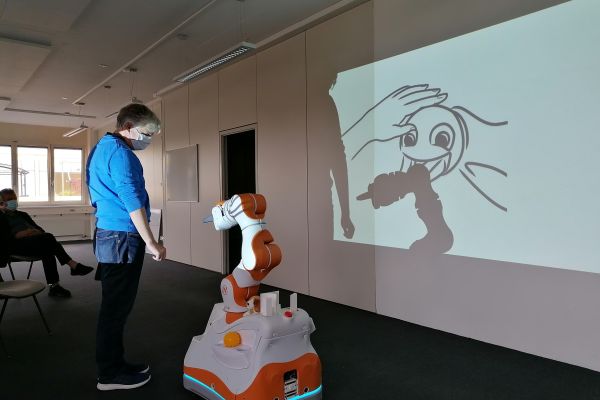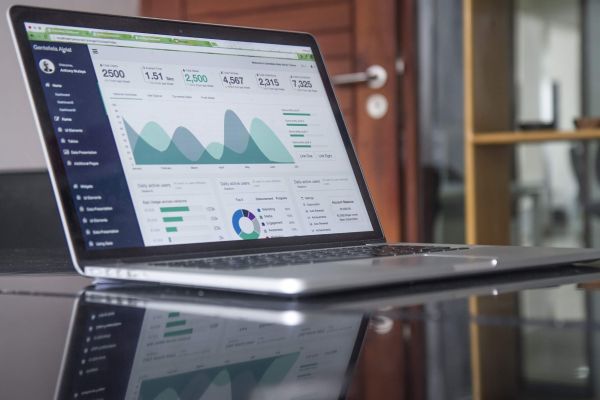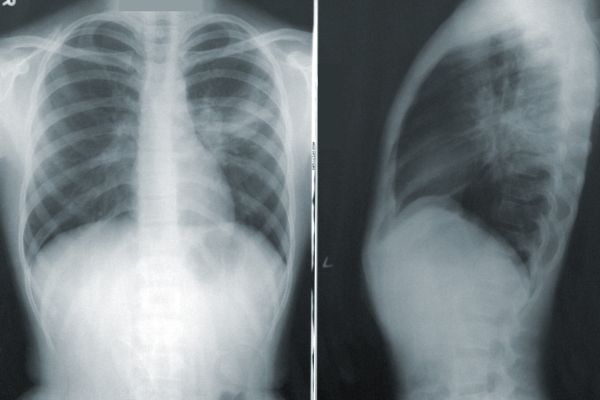Projects
Innovation projects between data innovation alliance members are the core of our activities. Leverage your innovation ideas by launching an innovation project within the Alliance. Data innovation alliance members profit from different options in our innovation initiative for shaping their own innovation process.
Call for participation makes your projects better. With trusted partners in the community you can develop new ideas. If you are an Academic Member you could find the right business partner, if you are an Industrial Member you can find the right research partner. Please contact us.
Here are some of the ongoing projects under the umbrella of the alliance.

Automatic Feature learning and Pattern recognition of Partial discharge applying deep-learning technologies
Partial discharge (PD) is the most reliable monitoring for generator stator insulation health status, and has been applied in industry since the 1990’s. This project aims to merge experience and knowledge from GE with state of the art methods in machine learning to improve the data analysis of PD. (see link)
Duration: Feb 2018 – Apr 2021
Partners: GE and ETH Zurich

Data-based analytics & predictions to increase overall wind plant revenues under market conditions
We develop and implement a cloud-based revenue optimization system for wind plant operators. By combining data analysis of real-time plant data with revenue schemes, revenue losses due to failures and sub-optimum control can be avoided, and profit can be increased by improved bidding strategies. (see link)
Duration: Oct 2018 – Jan 2021
Partner: WinJi AG, ZHAW

Lifestyle Change durch nachhaltige und personalisierte Interventionen
Entwicklung einer “Lifestyle Change Toolbox”, die die Dienstleistungsqualität von Interventionsprogrammen zur Prävention oder Behandlung von metabolischem Syndrom, Diabetes und Cholesterin verbessert. Dies wird durch personalisierte Interventionen und die Vernetzung der Leistungsanbieter erreicht. (see link)
Duration: Dec 2018 – Jul 2021
Partners: Lucullinary and HSLU

Adaptive Production Planning Systems for Fact Decision Support
Adaptive scheduling algorithms for sheet metal shop production planning are devised with unprecedented level of detail to support operations and to quickly answer requests for quotations, thus increasing reliability and competitiveness. (see link)
Duration: May 2019 – May 2021
Partners: Bystronic and IDP ZHAW

Automation of Legal Document Discovery
Today, in the field of personal damage law, legal case files consist of 400-5000 PDF-pages to be analysed manually by experts, a very time-consuming and costly task. Instead, our machine learning-based solution will extract relevant data and will thus empower an innovative case management software. (see link)
Duration: Oct 2019 – Apr 2022
Partners: legal.i and BFH

Automatische Auswertung thermoanalytischer Messkurven
Die dynamische Differenzialkalorimetrie misst die aufgenommene bzw. abgegebene Wärmemenge einer Probe, während diese aufgeheizt bzw. abgekühlt wird. Die Auswertung solcher Messkurven von unbekannten Materialien soll durch Deep Learning und statistische Methoden automatisiert werden. (see link)
Duration: Dec 2019 – Dec 2021
Partners: Mettler Toledo and CSEM

Chancen und Risiken sozialer Roboter für die Schweiz: Eine interdisziplinäre Studie für TA-SWISS
In der interdisziplinären Studie werden Chancen und Risiken von neuen Anwendungen der Roboter, die Empathie simulieren und Emotionen wecken, abgeschätzt, insbesondere in den Bereichen Einsatzpotenziale, Akzeptanz, Ethik, Recht und Volkswirtschaft. Der Untersuchungsgegenstand der Studie umfasst vor allem psycho-soziale, ethische, rechtliche, volkswirtschaftliche Auswirkungen und politischen Aspekte dieser Technologie. Die Ergebnisse sind in einem Bericht darzustellen, der wissenschaftlichen Anforderungen genügt und der auch als Basis zur Information einer breiteren Öffentlichkeit dient. Die Situation soll auf Grund der in der Studie gewonnen Erkenntnisse in einer Gesamtbeurteilung bewertet werden. Der Bericht soll Empfehlungen zum weiteren Umgang mit dieser Thematik enthalten, die an Entscheidungsträger insbesondere in der Politik und an Stakeholder in den erwähnten Anwendungsbereichen gerichtet sind.
Duration: Sep 2019 – Mar 2021
Partners: F&P Robotics and APS FHNW

Datenbasierte Dienstleistungen nachhaltig umsetzen
Eine nachaltige Umsetzung datenbasierter Dienstleistungen bedingt die Optimierung des soziotechnischen Systems. Ziel ist die Erarbeitung einer Vorgehensweise und eines Methodensets, welche die Massnahmen beim Mensch, der Technik und der Organisation berücksichtigt und aufeinander abstimmt. (see link)
Duration: Feb 2019 – Feb 2022
Partners: Procomm IT Concepts and FHGR

FWA: Visual Food Waste Analysis for Sustainable Kitchens
A novel approach for a fully automated food waste management solution for commercial kitchens is investigated. Food waste is automatically detected using a new camera device, preprocessed in real-time and classified using machine learning algorithms. (see link)
Duration: Jul 2019 – Sep 2021
Partners: KITRO SA and Datalab ZHAW

IMPULSE – Digital twin-based services to support decision making along the product lifecycle of capital equipment
The project aims to prototype Digital Twins in six different industrial environments to explore how the Digital Twins can designed to improve business outcomes over the whole lifecycle. The lessons learnt will be shared openly with all partners from the innovation approach taken, and business models. (see link)
Duration: May 2019 – Mar 2021
Partners: Siemens Mobility, ZHAW

InnoEco
In Zusammenarbeit mit der Zürcher Hochschule für angewandte Wissenschaft (ZHAW) und der Hochschule Luzern (HSLU) hat die IDEE SEETAL für die Seetaler KMUs das Projekt «InnoEco» entwickelt. Das Projekt zielt darauf hin, die Unternehmen in der Entwicklung digitaler kundenzentrierter Dienstleistungen zu befähigen, unterstützen und zu fördern. Das Projekt will für Seetaler-KMU anwendbare Möglichkeiten und Instrumente schaffen, die Digitalisierung für innovative Dienstleistungen für Ihre Kunden zu nutzen. Das Projekt stärkt die Position der KMU im Standortwettbewerb.
Duration: 2019 – 2021
Partners: IDEE SEETAL and IDP ZHAW

NQuest – Natural Language Query Exploration System
There is a huge amount of valuable information hidden in a company’s database which is not easily accessible to business people. To query these databases, end users need to know the technical query language SQL as well as the database structure. However, typical end users do not have enough SQL skills to formulate complex queries. Even more so, higher-level analytics, e.g. “trend analysis over last month” or “detect outliers in the price fluctuation of product X over the last year” are hard to formulate even for SQL experts. Hence, the majority of non-expert users are basically not able to explore the available knowledge of their company.
Veezoo currently provides a system that can answer natural language queries against databases, with the goal of empowering all users inside a company to become data-driven and benefit from the available information. However, feedback from existing users shows that a wide range of customers completely lack familiarity with their own company’s databases. In practice, this leads to a severely limited adoption of systems that provide a natural language interface for databases, given that most users are not aware apriori which questions to ask or on which regions of data to focus, in order to get the most added value from the large amounts of knowledge made available to them. Therefore, in the lack of proactive suggestions, recommended insights, as well as data exploration guidance, only translating natural language questions to equivalent database queries is simply not enough.
In this project we tackle this important open issue to make natural language interfaces to databases more suitable for widespread adoption by designing novel algorithms on top of the current Veezoo system, through a service that proactively guides users in exploring the data and augmenting the company’s knowledge base. The service, called NQuest, will provide analytics mechanisms that empower a wide range of users to discover new insights in existing databases. (see link)
Duration: Jul 2019 – Jul 2021
Partners: Veezoo and ZHAW

Optimierung von Personaleinsätzen in der stationären Langzeitpflege (“CareOpt”)
Dienstpläne sind das Bindeglied zwischen Personal, Bewohnern und den betrieblichen Abläufen in
Pflegeeinrichtungen. In den Dienstplänen müssen persönliche Umstände der Pflegefachpersonen
und Präferenzen der Bewohner ebenso sorgsam berücksichtigt werden, wie wirtschaftliche und
rechtliche Rahmenbedingungen. Studien haben gezeigt, dass ein gut gestalteter Dienstplan die
Betreuungsqualität aber auch die Zufriedenheit der Pflegefachpersonen erhöht.
Das Forschungsprojekt «Optimierung von Personaleinsätzen in der stationären Langzeitpflege
(CareOpt)» wird als Projektmanager und Implementierungspartner von Dr. Alexander Grimm (CEO
Aspaara) und Dr. Kevin Zemmer (CTO Aspaara) geleitet. Von Seiten des Forschungspartners ZHAW
übernehmen Frau Prof. Dr. Maria Schubert von der School of Health Professions und Dr. Thomas
Herrmann vom Institut für Datenanalyse und Prozessdesign die Leitung. Das Forschungsprojekt
wird von der Schweizer Innovationsagentur Innosuisse aus Bundesmitteln über ein Jahr gefördert,
um wissenschaftsbasierte Innovation im Interesse von Wirtschaft und Gesellschaft zu fördern. (see link)
Duration: Sep 2019 – Mar 2021
Partners: Aspaara and ZHAW

PiaBreed: Machine Learning zur automatisierten Ovulations- und Geburtsüberwachung am Pferd
Datenerhebung und Entwicklung eines mobilen, nicht-invasiven Systems für Tierärzte und Züchter zur Erhebung wichtiger Vitaldaten mit dem Ziel, die Ovulation bei Stuten ohne Rektalkontrolle zuverlässig festzustellen sowie eine Fohlengeburt rechtzeitig vorherzusagen und deren Verlauf zu überwachen. (see link)
Duration: Nov 2019 – Dec 2021
Partners: Piavita and University of Bern

QU4LITY – i4.0 Quality Testing Cell
QU4LITY aims at developing a smart, fully automated, and modular cell for quality control (initially for bearing and shaft testing for INTERROLL SA, the main implementation partner) empowered by a pervasive use of key digital technologies towards Industrie4.0 paradigm full implementation. (see link)
Duration: Nov 2019 – Apr 2021
Partners: Interroll SA and SUPSI

RealScore – Scanning of Real-World Sheet Music for a Digital Music Stand
ScorePad’s sheet music scanning service works for highquality input; to scale up business, it should work as well for smartphone pictures, used sheets etc. Project RealScore enhances the successful predecessor project by making deep learning adapt to unseen data through unsupervised learning. (see link)
Duration: Sep 2019 – Mar 2022
Partners: ScorePad and InIT ZHAW

sMart EDge fabric for Iot Applications : MEDInA
MEDInA will enable the creation of low cost IoT self-adaptive Machine Learning based applications by developing an Intelligence as Service (InaaS) framework. InaaS will provide a shareable edge/cloud platform that supports ML Modules running on edges, improved by cloud, able to self-adapt locally. (see link)
Duration: Jul 2019 – Jul 2021
Partners: HEPIA Genève and SixSq

Steigerung der Datenteilbereitschaft in B2B als Grundlage für die Entwicklung von neuen, datenbasierten Geschäftsmodellen
More and more manufacturing companies are switching from product to service revenue and evaluating with new, outcome-based, business models. Many of these companies, however, are struggling to establish a clear business case in order to justify the investments in IoT . This project aims to identify the most attractive business models with regards to anticipated added value and implementation efforts, with focus on industrial companies within the MEM industry. In addition, we want to identify the main drivers to increase customer’s willingness-to-share data, as a basis for developing new data-based services. (see link)
Duration: April 2019 – April 2021
Partners: Ferrum and SML ZHAW

Value-Based marketing and sales of smart services
This project aims at developing a Value-Based Marketing & Sales method for Smart Services. The holistic method bases its four dimensions on advanced analytics of operational and market data. Thereby, it opens revenue opportunities for manufacturing companies in Switzerland through Smart Services. (see link)
Duration: May 2019 – Nov 2020
Partners: Siemens Mobility and HSG

Analyse zur optimalen Gewährleistung der Patienten-, und Bewohnersicherheit im Gesundheitswesen

A new platform for automatic skills extraction and validation of profiles to identify talents
Provide a platform to enable candidates to register their profile, request references and automatically validate their skills and expertise certification so that they can be saved for further use within the application and recruiting process. (see link)
Duration: Sep 2020 – Mar 2022
Partners: FFHS and Skills Finder

Boosting the SkillGym User Experience with Advanced Natural Language Understanding
The goal of this project is to boost the Quality of Experience of Lifelike’s existing leadership training product SkillGym by developing a novel technological solution based on cutting-edge Natural Language Understanding techniques. (see link)
Duration: Jan 2020 – Jan 2022
Partners: Lifelike SA, SUPSI ISIN

Confidential Computing with Trusted Execution Environments
Currently there is an unmet need for trust and privacy in multi-party data analytics (e.g. in cloud computing). A new solution approach using hardware-based trusted execution environments is called Confidential Computing. The Zurich-based and investor-backed startup decentriq is a provider of confidential analytics software using Confidential Computing and, together with Microsoft, Intel and Google, founding member of the Confidential Computing Consortium. In this project decentriq will be supported by researchers from ZHAW in the design and validation of four software prototypes in cooperation with SIX Group, Swisscom, Intel and two other industry partners. The prototypes form the basis for the Confidential Data Analytics Platform of decentriq, a software solution enabling confidentiality for multi-party data analytics. Furthermore, the goal is to understand adoption factors and barriers of Confidential Data Analytics in enterprises and develop a generic Confidential Analytics Canvas, a strategic template to identify new opportunities for the use of Confidential Data Analytics. (see link)
Duration: Jun 2020 – Dec 2020
Partners: dq technologies and ZHAW

Customs Clearance Engine
A machine learning engine able to predict and evaluate the plausibility of Swiss Customs clearance numbers based on good descriptions as well as providing all necessary information associated with those customs clearance numbers.
Since the volume of e-commerce business’ is steadily increasing over the last years, AAS, as a customs agency, faces the challenge to perform thousands of customs clearances a day for import or export.
Currently AAS is facing several challenges, which are expect to be solved with the mentioned engine:
- Customers not able to classify their goods: Prediction is needed to derive customs clearance numbers automatically.
- Customers able to deliver customs clearance numbers: Plausibility evaluation is needed to check the correctness of the data and be customs compliant.
- Time constraints: manual verification of customs data is very time consuming and restricts heavily the growing capacity of AAS in terms of numbers of customs clearances that can be accepted per day. On this matter, an engine which provides and automatically verifies most of good’s customs related data, would improve the efficiency and compliance giving AAS the chance to grow in volume and concentrate only on difficult cases which could not be solved automatically.
(see link)
Duration: May 2020 – Nov 2020
Partners: FFHS and AAS Freight

Deep Snow – Deep Learning for Snow Depth Monitoring
In Deep Snow, we apply deep machine learning on Earth observation data to monitor the extent and amount of snow in high-resolution and near real-time for the Swiss Alps. This quantitative information is important for tourism, hydropower, and risk assessment (floods and snow avalanches). (see link)
Duration: Oct 2020 – Oct 2022
Partners: ETH Zürich and ExoLabs

Development of a Smart Connected Product System for the Industrial Piping Business
It is the objective to develop a smart connected product system as well as associated digital services and business models for the industrial piping business. Such a product system enables suppliers and operators of piping systems to continuously monitoring, controlling, and improving the system. (see link)
Duration: Jan 2020 – Jul 2021
Partners: ZHAW and GF Piping Systems

DIR3CT: Deep Image Reconstruction through X-Ray Projection-based 3D Learning of Computed Tomography Volumes
Project DIR3CT aims at improving the image quality of CBCT images by deep learning (DL) the 3D reconstruction from X-ray images end-to-end. This enables a novel CBCT product to be used during radiation therapy and will allow the use of these images for adaptive treatment. (see link)
Duration: Feb 2020 – May 2022
Partners: ZHAW and Varian Medical Systems Imaging Laboratory

Document classification and information extraction for workflow selection
This project will leverage cutting-edge Natural Language Processing techniques for document classification and information extraction to automatically initiate specific tasks based on the content of documents in electronic repositories. (see link)
Duration: Jul 2020 – Jul 2022
Partners: SUPSI and Karakun

Entwicklung des Abfallwirtschafts-Ökosystems mit Hilfe eines intelligenten, vernetzten Produkt-Service-Systems (PSS)
Das Projekt soll die Potentiale der Digitalisierung für das Abfallwirtschafts-Ökosystem der Schweiz nutzbar machen. Dazu werden ein Sensor- und Konnektivitätsmodul für Abfallbehältnisse und entsprechende Datenanalyse- und Serviceprozesse angeschlossener Systeme entwickelt und validiert. (see link)
Duration: Jul – 2020 – Apr 2022
Partners: ZHAW and Anta Swiss

MAPEC-Automated method for lighting planning of a municipality
The MAPEC project offers an innovative and powerful analysis method for planning where, when and how to shed light while proposing an economic optimization of actions. (see link)
Duration: Jun 2020 – Dec 2021
Partners: HES-SO and Navitas Consilium

NxSights – Dynamic Organization Charts

RASPLAN
Development of a technology capable of estimating the risk of shallow landslide events, based on numeric soil models and water saturation maps. The latter are obtained from a sparse network of automated soil moisture profile sensors and data spatialization by machine learning techniques. (see link)
Duration: Sep 2020 – Sep 2022
Partners: SUPSI DTI and Geoalps Engineering

STAR – Synthetic Total Audience Rating
The project aims at creating a Total Audience Rating framework, an innovative solution based on Human Behavioural Analysis and Machine Learning by producing a matching criteria between data representing what and when a complete population watches on television, and who is actually watching. (see link)
Duration: May 2020 – May 2022
Partners: SUPSI and Nielsen TV Audience Measurement

User-based Redistribution für Freefloating Car-Sharing
Wir entwickeln ein neues System zur aktiven Einbindung von Nutzern im Freefloating-Carsharing. Nutzer werden zu Co-Produzenten, indem sie mithelfen, die Autos optimal zu positionieren. Dies wird realisiert durch ein neuartiges intelligentes Anreizsystem. (see link)
Duration: Jun 2020 – Dec 2022
Partners: ZHAW and Mobility

Vergleichsplattform für Pensionskassen und Konzeption von dazugehörigem B2B Geschäftsmodell

Ada – Advanced Algorithms for an Artificial Data Analyst
Ada – the Artificial Data Analyst – raises the productivity of data science endeavours by applying data science to itself: we apply empirical optimization also to algorithm and feature selection. Recent developments, e.g. from the MIT, are thus made available as a data product for Swiss industry. (see link)
Duration: Oct 2017 – Apr 2019
Partners: PwC and Datalab, ZHAW

Concepts and tools for data science specifically adapted to SMEs
Leveraging data and analytics is essential for companies to keep up with competition, in particular for manufacturing companies. For small organizations, building up the appropriate resources as well as the knowledge and skills represents a major challenge. Specific approaches are required. This project investigates this topic.
Duration: Jan 2018 – June 2019
Partner: Several SMEs and FH St. Gallen, FH Vorarlberg and HTWG Konstanz

Entwicklung eines Leitfadens für die Gestaltung von Anwendungen mit humanoiden Robotern mit psychlogischen Werkzeugen und Theorien
Im Rahmen des Innovationsschecks wird untersucht, mittels welchem Verhaltensrepertoire und welchen Features humanoide soziale Roboter der Klasse Nao/Pepper die Kontaktaufnahme sowie den Start in ein Gespräch erfolgreich und mit sozialer Akzeptanz durch die menschlichen lnteraktionspartner bewältigen können. Die Firma Avatarion ist ein von Saftbank Ltd. (Hersteller der Roboter Nao und Pepper) lizensierter Distributor der humanoiden Nao- und Pepperroboter für die Schweiz. Avatarion stellt mit der Yeo-Suite eine Programmier-schnittstelle bereit und bietet Programmierdienstleistungen an. Avatarion beobachtet immer wieder, dass der Start einer Interaktion mit einem sozialen Roboter für viele Kunden eine kritische Herausforderung darstellt. Dies weil der Roboter überschätzt wird oder weil zu wenig Wissen über die Funktionsweise existiert. In der Folge kommt es auf Seiten von Usern zu Frustration und zu ablehnendem Verhalten. Ein sozial akzeptiertes, proaktives Annäherungs- und Kontaktaufnahmeverhalten von Nao und Pepper stellt einen notwendigen Grundbaustein dar, auf den weitergehende Nutzungsszenarien aufsetzen wie z.B. in Rezeptions-, und Guidanceanwendungen. (see link)
Duration: Oct 2018 – Oct 2019
Partners: Avatarion Technology and FHNW

Harmonized API for marketplace of climate hazards data
DAA operates in industrial data logistics. We provide digital accessibility of industrial data to com-panies and realize multi-stakeholder use cases such as real-time risk assessment for insurers of industrial assets. In course of the business, we establish an API-based platform for inter-company data exchange or direct data monetization. An important and growing risk for insurers of commercial property and assets are natural hazards. geo7 is a leading geospatial analytics office, focused on natural hazard modelling and quantifica-tion in Switzerland and abroad. As part of the business, geo7 collects, cleans and augments geo-spatial data from various sources. These activities result in higher-value data sets than the raw data sourced, in terms of information content and in-house accessibility. This project aims on making geo7’s natural hazard data sets available to external customers through DAA’s APIs and a standardized ontology. This requires scalable harmonization of the data, the integration into DAA’s knowledge graph and the provisioning of an API. The project brings the following, not exhaustive, added value to the participating organizations: • geo7: Possibility to provide natural hazard data sets for direct monetization (pay-per-use sale) and for business development activities. Possibility to add more data in a cost-efficient way, once this project delivered an initial infrastructure. • DAA: Possibility to upgrade the existing data base with new, high-quality data to augment own modeling capacity. Possibility to increase the existing API pool and data ontology by the very topic of Swiss natural hazards data.
Duration: Q2 2019
Partners: dataaheadanalytics and geo7

Proof of Concept einer virtuellen Bemusterung im Bauprozess
Im Rahmen des Innovationsschecks sollen die Machbarkeit und die Belastbarkeit von Methoden zur virtuellen Bemusterung empirisch nachgewiesen werden. Konkret wird die Güte von Entscheidungen in einem realen Setting mit derjenigen in einem virtuellen Setting verglichen. Die Ergebnisse der Studie dienen dazu, die Potenziale und Risiken einer Bemusterung in VR Räumen auf Basis experimentell ermittelter Daten fundiert einschätzen zu können. Im Zentrum steht der Nachweis von Nutzenpotenzialen und Einsatzmöglichkeiten virtueller Methoden zur Bemusterung. (see link)
Duration: Aug 2018 – Nov 2019
Partners: HEFTI. HESS. MARTIGNONI. Aarau and APS FHNW

SAMBA: Segmentation and Advanced Mapping of Brazil’s Agriculture
Complex global systems, like water cycles, agriculture, forestry, and many others, affect billions but are still poorly understood. Understanding these systems is crucial not only for the well-being of humanity, but also for companies that need to adapt to a changing environment. For decades, Earth observation (EO) satellites have been collecting data about our planet – providing valuable information on the impact of climate change on our environment. In particular, agriculture it is highly susceptible to environmental changes, as rising temperatures and reduced precipitation, for example, have a major impact on yields. Within SAMBA we assess the value of operational EO data for monitoring and assessing crop resources. In this proof-of-concept, the added value of the synergistic use of multiple satellite missions as base for an operational and scalable monitoring of agricultural areas at the national level (using Brazil as an example) is demonstrated. Within the framework of classification, up-to-date methods of data mining and machine learning are used. The results are maps of agricultural areas in a spatial and temporal resolution that had hardly been achieved up to then. SAMBA is implemented based on a cloud infrastructure using Amazon Web Services as well as a stand-alone application for internal use, which allows to demonstrate transferability and robustness of the methods developed in SAMBA.
Duration: 2019
Partners: ExoLabs and SwissRe

Blockchain-basierte Track and Trace Plattform
Introduction
The Swiss elections 2019 have shown that the trend towards sustainable food production will increase. In Switzerland, many regional labels aim at promoting regional production and aiding local producers through an optimal and innovative use of their resources. For example, Pro Zürcher Berggebiete (PZP) awards regional products with the label natürli® to foster regional production. These regional networks encompass producers of meat, cheese, fish and wood. The goal of the labels is to strengthen the regional value chains. PZB plans together with the ZHAW a research project to increase the efficiency of the certification process and create opportunities for new business models.
Problem Formulation
Currently, the certification of products is a tedious and costly process: PZB needs to register new products and collect paper-based documentation from the producers. To obtain the natürli®-label, producers are checked by external certification institutions. This involves visiting the producers, manually examining documents and recording this data. Once registered, the control of the PZB guidelines needs to be repeated every four years. The whole process is expensive and offers only limited transparency on the product’s origin. A high fraction of the work is done manually and redundantly. In Switzerland, there are countless regional labels similar to PZB suffering from similar inefficiencies.
Solution Approach
The project aims at tackling the beforementioned problems by the development of a shared blockchain-based platform connecting all the stakeholders. This platform should lead to a digitalization and automation of the certification process.
Expected Benefit
– Digitisation of paper-based documents
– End-to-end information flow
– Automation of certification process
– Remote certification
– Transparency for end-consumer
– Reduction of redundancies for labels
(see link)
Duration: Aug 2019 – Feb 2020
Partner: Pro Zürcher Berggebiet, ZHAW

Digital Insurance Broking
The goal is the development of an application that enables the statistical comparison of risk and insurance profiles. This allows the users of the e-Broker platform to compare themselves with other customers (peers) and to automatically identify coverage gaps and overinsurance. (see link)
Duration: Mar 2018 – May 2020
Partner: Optimatis and ZHAW

Digital Marketplace
With technologies of data science, Skillue develops a digital marketplace, which makes, based on the demanded and offered skills, the benchmarking of talents, jobs and companies possible. Skillue creates a new encounter zone for candidates and companies. (see link)
Duration: Jun 2018 – Jun 2020
Partner: Skillue AG, ZHAW

Machine learning for validation and cross-use of open geospatial data
Points-of-Interest (POI) sind Geodaten mit hohem Marktwert, die für räumliche Datenanalysen benötigt werden. Diese Location Intelligence ergänzt Artificial Intelligence und Big Data in Branchen von Marketing, Security (Crime Prediction), Immobilien (Investment) bis zur Logistik (Standortwahl, Supply Chain Management). POI-Daten wurden bisher von Grossunternehmen wie Google oder Hexagon/TomTom kommerziell angeboten. Mit den offenen Daten des Projekts OpenStreetMap (OSM) ist jüngst eine Alternative dazu entstanden, die teilweise quantitativ gar besser ist als die kommerziellen Angebote.
Eine Herausforderung der OSM Daten ist deren schwer bestimmbare Qualität, insbesondere die Vollständigkeit. Die innovative Idee des vorliegenden Projekts ist, die Qualität der POIs in OSM mittels eine Kombination moderner statistischer Verfahren zu bestimmen. Der Ansatz, POI aus OSM mit vorhandenen (z.B. amtlichen) Daten zu vergleichen, kommt oft mangels verfügbarer amtlicher Daten nicht in Frage. Daher wurde eine intrinsische Datenanalyse entwickelt: In Phase eins werden Trainingsdaten mit automatischer, nicht-überwachter Daten-Generierung erzeugt. Anschliessend werden in Phase zwei Neuronale Netze trainiert, die die Vollständigkeit eines bestimmten Gebiets abschätzen.
Dieses Verfahren wird es über POI hinaus erlauben, Charakteristika von Geodaten zu validieren und Mängel zu beheben. Wir sehen eine direkte Weiterentwicklung zu Naturgefahren und Risikoanalyse für Energienetze und Immobilien vor. (see link)
Duration: Jan 2020 – Jul 2020
Partners: HSR and Data Ahead Analytics

QualitAI – Quality control of industrial products via deep learning on images
QualitAI provides research and development towards a machine for automatic quality control of industrial goods like balloon cathethers. This is enabled by recent innovations in the area of artificial intelligence (AI), specifically the analyis of images via so-called deep learning. (see link)
Duration: Jul 2017 – Feb 2020
Partners: BW-TEC and ZHAW

CALL-E: Virtual Call Agent
Comparis and ZHAW develop a dialogue system that can support online brokering of loans, mortgages and insurances. It will initiate calls to potential clients, aggregate missing data and answer user questions. Main objective is to generate fluent and trustworthy interactions. (see link)
Duration: Jun 2018 – Mar 2021
Partner: Decisis Services and ZHAW